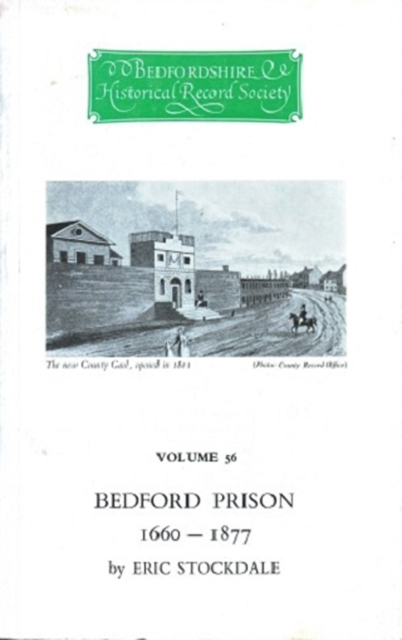Book contents
- Frontmatter
- Contents
- Acknowledgments
- Foreword
- Introduction
- Chapter 1 John Bunyan 1660-1688
- Chapter 2 Some Contemporaries of Bunyan
- Chapter 3 The Richardson-Howard Family of Jailers 1711-1814
- Chapter 4 Transportation to America Before 1776
- Chapter 5 John Howard 1773-1790
- Chapter 6 Samuel Whitbread 1790-1815
- Chapter 7 Philip Hunt 1815-1835
- Chapter 8 Philip Hunt 1815-1835
- Chapter 9 Lord John Russell In Office 1835-1841
- Chapter 10 The Rebuilding of The Jail 1839-1849
- Chapter 11 The Unsettled Years 1849-1853
- Chapter 12 The Final Years Before Nationalisation 1853-1877
- Conclusion
- Note On References and Spelling
- Appendix 1 Bedford in 1765
- Appendix 2 Jailers of Bedford 1710-1885
- Appendix 3 The Richardson-Howard Family
- Appendix 4 Site Plan of Bunyan’s Jail
- Appendix 5 Deed of Appointment of Jailers 1740
- Appendix 6 The Whitbread-Howard Link
- Appendix 7 Lord John Russell’s Family
- Appendix 8 Bedford in 1841
- Appendix 9 The Jail in 1849
- Index of Names
- Subject Index
- Bedfordshire Historical Record Society
- Miscellaneous Endmatter
- Frontmatter
- Contents
- Acknowledgments
- Foreword
- Introduction
- Chapter 1 John Bunyan 1660-1688
- Chapter 2 Some Contemporaries of Bunyan
- Chapter 3 The Richardson-Howard Family of Jailers 1711-1814
- Chapter 4 Transportation to America Before 1776
- Chapter 5 John Howard 1773-1790
- Chapter 6 Samuel Whitbread 1790-1815
- Chapter 7 Philip Hunt 1815-1835
- Chapter 8 Philip Hunt 1815-1835
- Chapter 9 Lord John Russell In Office 1835-1841
- Chapter 10 The Rebuilding of The Jail 1839-1849
- Chapter 11 The Unsettled Years 1849-1853
- Chapter 12 The Final Years Before Nationalisation 1853-1877
- Conclusion
- Note On References and Spelling
- Appendix 1 Bedford in 1765
- Appendix 2 Jailers of Bedford 1710-1885
- Appendix 3 The Richardson-Howard Family
- Appendix 4 Site Plan of Bunyan’s Jail
- Appendix 5 Deed of Appointment of Jailers 1740
- Appendix 6 The Whitbread-Howard Link
- Appendix 7 Lord John Russell’s Family
- Appendix 8 Bedford in 1841
- Appendix 9 The Jail in 1849
- Index of Names
- Subject Index
- Bedfordshire Historical Record Society
- Miscellaneous Endmatter
Summary
After the writer had completed his first draft of the present work, two relevant histories appeared in 1975, one concerned with Reading, the other with Gloucestershire. In The Story of a Prison Peter Southerton deals with Oscar Wilde’s principal place of detention, but he only really starts in the nineteenth century. J. R. S. Whiting in Prison Reforms in Gloucestershire 1776-1820 has produced a long-overdue biography of Sir George Onesiphorus Paul which is excellent, but obviously only a limited period is discussed. It is hoped that the present work will have been found not only to cover a longer period, but also to have shown the relationship of local and national moves for reform, together with the interplay of the experience of the county magistracy with the plans of the Home Secretary.
Man has probably always had mixed feelings about the prisoner, including the following: ‘It serves him right’, ‘Others will be deterred by his example’, and of course, ‘He is better off inside’. Rather different have been the responses: ‘What a terrible place to keep a man’, ‘How can we reform him in that way?’ and ‘What are we doing to his family?’ Justices concerned with the running of prisons have not been immune from ambivalence, and they have had their personal feelings influenced also by considerations of what was customary, what the High Sheriff or their colleagues might think if they took one step rather than another, and by considerations of cost. The jailers were obviously influenced by the need to keep a family as well as by the need to ensure that no prisoner escaped—for purely personal reasons apart from others. Overlying all these attitudes have been religious questions.
The Bible has been used as a justification for the most horrible cruelties as well as an inspiration for real kindness. It has also led to some cruelties which were a result of a misguided intention to be kind. George Bernard Shaw referred to ‘The Ruthlessness of the Pure Heart’.
- Type
- Chapter
- Information
- Bedford Prison 1660-1877 , pp. 215 - 217Publisher: Boydell & BrewerFirst published in: 2023



